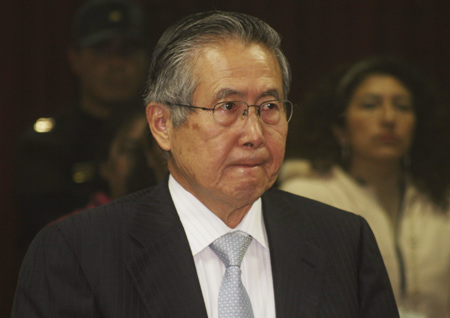Former Peruvian President Alberto Fujimori was sentenced on Monday to seven and a half years in jail on charges of embezzling 15 million US dollars from state funds to pay his intelligence chief.
This is the third conviction Fujimori has received since he returned to Peru from exile in 2007.
 |
|
File photo shows that Former Peruvian President Alberto Fujimori attends his trial at the Special Police Headquarters in Lima September 08, 2008. [Xinhua] |
Fujimori, who ruled the country from 1990 to 2000, has previously received a penalty of 25 years in prison for violation of human rights, and a six-year imprisonment for abuse of power.
So far, Fujimori, 70, will have to spend a maximum of 25 years behind bars, as prison sentences are served concurrently in Peru.
Fujimori exiled himself to Japan in 2000 after his government collapsed after corruption scandals. He was arrested in Chile and was extradited to Peru in 2007.
A series of trials
Fujimori acknowledged in court that he had paid 15 million dollars to his intelligence chief Vladimiro Montesinos, but refused to accept any legal responsibility, saying he made the payment because Montesinos was then planning a coup against him.
"I was obligated to do it because the stability of the country was at risk ... given the total control that ex-adviser Vladimiro Montesinos had over the military leadership," Fujimori said.
In 2007, Fujimori was accused of having ordered an illegal raid on the home of Montesino's wife. He was convicted of abusing power and sentenced to six years in jail.
In April this year, Fujimori was sentenced to 25 years in prison for authorizing death squads that killed 25 civilians in two bloodbaths in 1991 and 1992, as well as ordering the kidnapping of a businessman and a journalist in 1992.
Fujimori still faces another trial on charges of authorizing illegal phone tappings and congressional bribes, and using state funds to purchase a TV station to air political propaganda.
Ten years in office?
Fujimori had ruled Peru for 10 years before his dramatic resignation in 2000 after a corruption scandal involving his administration was exposed.
During his first term from 1990 to 1995, Fujimori ambitiously launched neoliberal reforms and privatization campaigns to revive the country's lagging economy. At the end of 1994, Peru's economy reported a world-leading growth rate of 13 percent.
Facing difficulties in combating the guerilla Sendero Luminoso, Fujimori carried out a coup of his own government in 1992, whereby he shut down the Congress and suspended the constitution.
Polls at that time showed the coup was largely welcomed by the public, although it was condemned by the Organization of American States (OAS) and other countries.
In 1995, Fujimori won a second term with almost two thirds of the votes.
According to the Peruvian Constitution in 1993, the presidency was limited to two terms. However, the Congress passed a law to allow Fujimori to run for a third term.
Fujimori won the 2000 elections with a bare majority. However, his standing was hurt by a corruption scandal in September that year when a cable TV channel broadcast a video showing Montesinos bribing an opposition congressman.
Fujimori's popularity collapsed and he escaped to Japan, from where he sent his resignation in Novermber 2000.
Fujimori has been credited by many Peruvians for ending the fight with guerilla Sendero Luminoso, although his controversial iron hand methods such as granting the military broad powers to arrest suspected rebels, were widely criticized.
Under his rule, Peru's Gross Domestic Product (GDP) grew by a total of 44.6 percent from 1992 to 2001, or an average of 3.76 percent per year.
The country also managed to reduce the national malnutrition index by about 29 percent from the period 1990-1992 to 1997-1999, according to the United Nations Food and Agriculture Organization.
Despite a raft of accusations against Fujimori, his daughter Keiko Fujimori, who will run for president in 2011, maintains roughly a 20 percent lead in opinion polls.
Keiko, an opposition legislator, said she wants to win the election to clear the accusations against her father.
(Xinhua News Agency July 21, 2009)